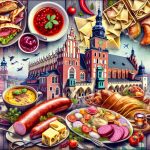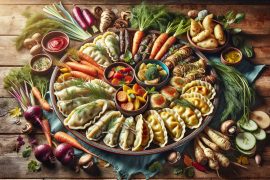
Poland is a country full of traditions and customs that make it unique. Its culture is a mix of old traditions and modern life, creating a vibrant society. Polish people celebrate religious holidays with seriousness and enjoy folk music and dance with great enthusiasm. The food in Poland tells you a lot about the country’s connection to nature, as it often includes local and seasonal products.
When we look into everyday life, family relationships, and how welcoming Polish people are, we see what makes the Polish community special. Poland is a nation that is very proud of its past and keeps its traditions alive. Let’s take a closer look at how these traditions and customs play a crucial role in the everyday life of Polish people.
Celebrating Polish Holidays
Polish holidays are more than just days off; they’re a way for people in Poland to connect with their past and each other. These holidays mix history, religion, and community spirit. For example, on All Saints’ Day, Polish families gather to remember loved ones who have passed away. They visit cemeteries, clean graves, and light candles, creating a sea of light that’s both beautiful and moving. It’s a powerful way to honor ancestors and keep their memories alive.
Then there’s Constitution Day, a lively celebration of Poland’s long history of independence and self-governance. Parades, picnics, and public speeches fill the day, reminding everyone of the country’s journey and achievements. It’s a day of national pride, where people reflect on their rights and freedoms, and the sacrifices made to secure them.
These holidays do more than just commemorate historical events or religious traditions; they strengthen the ties between people. They’re opportunities for families and communities to come together, share stories, and create new memories. This sense of belonging and unity is crucial in today’s world, where it’s easy to feel disconnected.
Moreover, these celebrations offer a peek into the Polish way of life, showcasing the country’s values, such as respect for history, the importance of family, and the strength found in community. Whether you’re Polish or just interested in learning about different cultures, participating in or observing these holidays can be a deeply enriching experience.
To truly engage with these traditions, consider cooking a traditional Polish meal during these holidays, like pierogi or bigos, or learning a Polish song or dance. It’s a fun, hands-on way to immerse yourself in the culture and make the celebration even more meaningful.
Culinary Delights of Poland
Polish cuisine is all about bold tastes and satisfying ingredients. It mirrors the country’s history and the various cultural influences it has absorbed over time. Take pierogi, for example. These dumplings are a staple in Polish kitchens and come with a wide array of fillings. You can find them stuffed with savory options like minced meat, cheese, and potatoes, or with sweet fillings such as seasonal fruits. It’s this variety that highlights the creativity and flexibility of Polish cooks.
Then there’s bigos, often called hunter’s stew. This dish brings to the table a slice of Poland’s foraging and hunting traditions. It’s a hearty mix of different meats, sauerkraut, and wild mushrooms, all simmered together to create a rich and deep flavor. It’s a perfect example of how traditional practices continue to influence Polish cooking.
Bread also plays a significant role in Poland’s culinary scene. Reflecting the nation’s farming heritage, Polish bread comes in various grains and styles. These aren’t your ordinary loaves; they’re dense, packed with flavor, and form an essential part of both everyday meals and special celebrations.
Through these examples, we see a cuisine that not only honors its past but is also open to adaptation. Polish food is a true reflection of the country’s spirit, offering a comforting and hearty experience that’s both traditional and innovative. So, if you’re looking to explore a cuisine that’s rich, diverse, and full of history, Polish dishes are definitely worth a try. Whether it’s the versatile pierogi, the robust bigos, or the traditional breads, there’s a depth of flavor and history in each bite.
The Polish Approach to Family
In Poland, the importance of family is a fundamental aspect of the culture, shaping many daily practices. Unlike the more nuclear family focus seen in some cultures, Polish families often include extended members, such as grandparents, who play an integral part in raising children and passing down cultural heritage. This setup, where multiple generations live under one roof or maintain close ties, creates a strong network of support and facilitates the easy sharing of traditions, language, and religious beliefs.
For example, during holidays like Christmas or Easter, it’s common for Polish families to gather for meals that feature traditional dishes, engage in storytelling that bridges generations, and participate in activities that emphasize shared values. These gatherings are not just about enjoying food together but also about reinforcing the bonds that tie the family together.
Respect for elders is another key aspect of the Polish family ethos. It’s common for younger family members to take on caregiving roles for their elders, demonstrating a deep-seated belief in family solidarity and mutual support. This practice not only ensures that older family members feel valued and cared for but also strengthens the intergenerational ties that are so vital to the family structure.
This approach to family life, with its emphasis on unity, tradition, and interdependence, is central to understanding Polish society. It shows how family isn’t just an abstract concept but a living, evolving network of relationships that nurtures individuals from cradle to grave, providing them with a sense of identity and security.
In a more general sense, the Polish family model offers an interesting perspective on the importance of maintaining strong family ties and the positive effects these can have on individuals and communities. It serves as a reminder of the value of traditions, the respect for elders, and the strength found in unity, lessons that can resonate well beyond the borders of Poland.
Music and Dance Traditions
In Poland, music and dance are not just forms of entertainment; they are vital parts of the culture that bring people together and keep historical traditions alive. Polish music spans a wide range, from the classical masterpieces of Chopin and Penderecki to the lively folk tunes heard at local festivals. These musical styles provide a soundtrack to Polish life, marking celebrations and significant events with songs that have been passed down through generations.
Take, for example, traditional Polish dances like the Polonaise and Mazurka. These dances are more than just steps to music; they are a display of Poland’s history and its regional differences. Each dance has unique steps and rhythms that tell a story, often performed in colorful costumes that reflect the historical and regional backgrounds of the dancers. This aspect of Polish culture is not just for locals; these dances are performed worldwide, showcasing Polish heritage on a global stage.
What makes these musical and dance traditions so important is their ability to connect Poles to their cultural roots. By participating in these traditions, whether by dancing at a festival or listening to a folk song, individuals feel a sense of belonging to a larger community with a rich history. Moreover, these traditions are not static; they evolve with time, incorporating modern influences while preserving their core essence. This evolution ensures that Polish music and dance remain relevant and continue to enrich the cultural landscape of Poland.
Daily Routines in Poland
In Poland, the daily routine is a blend of modern life and longstanding traditions, giving us a glimpse into the values and culture of its people. The day often starts early with everyone in the household sitting down for breakfast together. This practice isn’t just about eating; it’s a time for family members to connect before they head out for their day, showing how much Poles value family bonds and community.
During the workday, which follows the usual nine-to-five schedule, there’s a significant pause around noon for lunch. This break is more than just a quick meal; it’s a substantial feast that provides not only nourishment but also a moment of rest. This practice reflects the Polish emphasis on the importance of food and taking a breather in the midst of a busy day.
After work, the evening is a time for winding down and spending quality time with family or engaging in leisure activities. Many people enjoy taking strolls in the park or participating in cultural events. This balance of work and relaxation is crucial in Polish culture, showing a healthy approach to life where there’s time allocated for both responsibilities and enjoyment.
Weekends in Poland often turn towards more traditional activities. Attending church services is common, emphasizing the significant role of faith in many Poles’ lives. Visits to extended family are also typical, reinforcing the importance of familial ties. These traditions offer insight into the value placed on religion and family in Poland, elements that have been central to Polish culture for generations.
Conclusion
Poland’s culture is rich with traditions, customs, and daily activities that are central to its identity. National holidays are big here, and people love celebrating them. Eating Polish food is another important part of our culture, as well as strong family ties and enjoying music and dance together.
These aspects, along with our everyday routines, show how deeply connected we are to our heritage while also keeping up with the modern world. We’re proud of where we come from and are always ready to adapt and move forward.






Comments are closed.